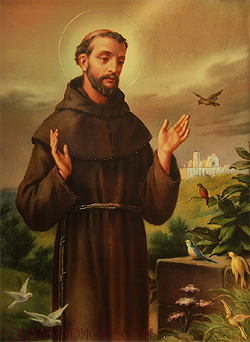Penance
By Fr. Richard Rohr, OFM
“Penance” for Francis was not some kind of dark asceticism, but it was a proactive free leap into the problem ahead of time. This man profoundly understood freedom. It is the same freedom that we see in Jesus when he says “You are not taking my life from me, I am laying it down freely” (John 10:18). In the opening words of his last will and testament, Francis brilliantly says, “The Lord gave me, Brother Francis, to begin to do penance in this way. For when I was broken, it seemed too bitter for me to see lepers, and the Lord himself led me among them and I showed mercy to them; and when I left them what before had seemed bitter to me was now turned into sweetness of soul and body. Afterwards, I waited just a little bit and then I left the world.”
His phrase “left the world” did not mean leaving creation. It meant leaving what we might call the “system.” Francis left business as usual, and he began what he called an alternative life, which at that time was called “a life of penance” or abandoning the system. He decided to live a life focused on alleviating the needs and the suffering of others instead of a life of self-advancement. Most of our decisions are usually based on personal, egoic preference and choice. This is the life that we are called to “leave,” the self that Jesus says must “die” to fall into our Larger Life or True Self. Freedom for both Jesus and Francis was purely and simply freedom from the self which is precisely freedom for the world. This is so utterly different than our American notion of freedom.
In order to be free for life, we must quite simply be free from our small selves. Francis knew that Jesus was not at all interested in the usual “sin management” task that clergy love to think is their job. He saw that Jesus was neither surprised nor upset at what we usually call sin. Jesus was upset at human pain and suffering. What else do all the healing stories mean? They are half of the Gospel! Jesus did not focus on sin. Jesus went where the pain was. Wherever he found human pain, there he went, there he touched, and there he healed. Francis, who only wanted to do one thing—imitate Jesus—did the same. But you cannot do that, or even see it, unless your first question is something other than “What do I want?” “What do I prefer?” or “What pleases me?” In the great scheme of things, it really does not matter what I want. We are not free at all until we are free from ourselves. It is that simple and that hard.

